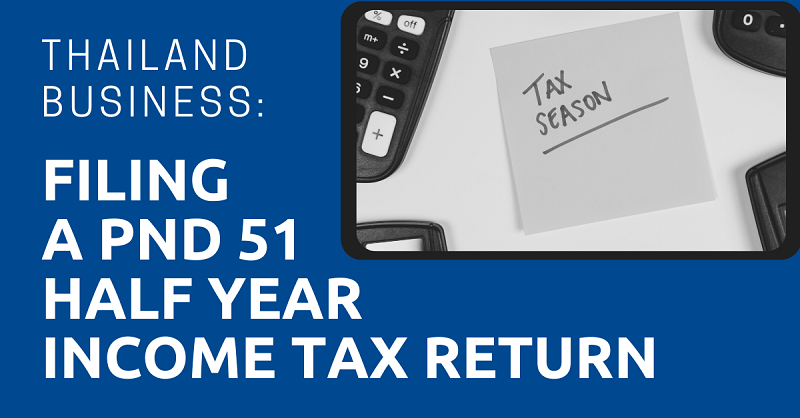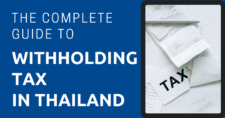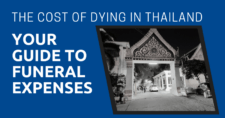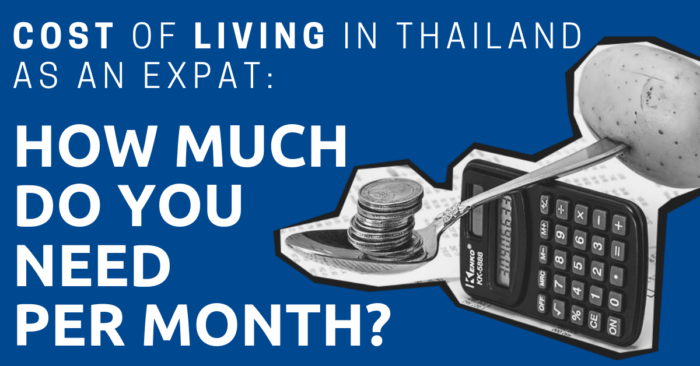
Although Muay Thai originally brought me to Thailand, it was the country’s low cost of living that kept me here full time since 2014.
In fact, the quality of my life has improved drastically since leaving the U.S more than a decade ago. Not only because of the inexpensive prices on rent, food, and healthcare, but also because of the amount of time I got back. And with all that free time and fewer expenses, I’m able to enjoy life much more.
In this guide, I’m going to share some of my average costs associated with living in Thailand, and also the costs of a few of my friends and our faithful readers so that you can get a variety of budgets.
*Throughout this guide I use an exchange rate of US$1 to THB34.
"*" indicates required fields
Disclaimer: This article may include links to products or services offered by ExpatDen's partners, which give us commissions when you click on them. Although this may influence how they appear in the text, we only recommend solutions that we would use in your situation. Read more in our Advertising Disclosure.
Contents
- Overview of the Cost of Living in Thailand
- Rent
- Essential Bills
- Extras
- Food and Drinks
- Insurances
- Personal Care
- Transportation
- Travel
- Entertainment
- Education
- Legal
- Average Cost of Living in Thailand by Location
- How Lifestyle Choices Impact Your Cost of Living in Thailand
- Effects of Inflation on Thailand’s Cost of Living
- Living in Thailand on US$1,000 Per Month
- Living in Thailand on US$2,000 Per Month
- Living in Thailand on US$3,000 Per Month
- Living in Thailand on US$5,000 Per Month
- Cost of Living in Thailand for One Year
- Where Are the Cheapest Places to Live in Thailand?
- How Much Do You Need Per Month?
- Cost of Living Vs. Quality of Life According to ExpatDen Readers
- What’s Your Cost of Living?
(And How It’s Costing Them)
Most expats throw money away, get lost in red tape, and miss the local hacks that make life easier and cheaper. ExpatDen Premium gives you the secrets seasoned expats use to save, earn, and thrive beyond the basics, saving you thousands and opening doors you didn’t even know existed.
Here’s what’s inside:
- Housing Hacks: Slash your rent by 40% or more - because the locals are laughing at what you’re paying.
- Banking Mastery: Stop wasting on fees and get top exchange rates. Why give your money away?
- Healthcare for Local Prices: Quality treatment without the expat price tag.
- Visa and Legal Shortcuts: No more bureaucratic nightmares. Get the visa and residency secrets that others pay their lawyer dearly for.
- Deep Discounts: Find the savings locals rely on for groceries, dining, and more.
If you’re serious about making Thailand work for you, join ExpatDen Premium and make Thailand work for you.
Overview of the Cost of Living in Thailand
I’ve found that the cost of living in Thailand depends on two things:
- where you live
- the lifestyle you’re after
Although I did my best to reflect the increase in prices due to 2022’s global inflation, the cost of living in Thailand for each category are only averages.
For example, a bowl of khao soi costs about THB70 on the outskirts of Bangkok. But when I eat khao soi at one of my favorite spots in Silom in the city, I pay over THB100 for the same meal. Just to give you some perspective on Thailand’s price differences, when I was in Phrae and Chiang Mai in the north of Thailand, I paid THB50 for a bowl of khao soi.
That said, you can use the average costs we’ve cited in the sections below to estimate your living expenses.
To give you a rough idea, here’s the average cost of living in Thailand for a single person who chooses to live in Bangkok and eat out regularly. These costs can increase or decrease depending on your lifestyle.
| Type | Cost |
| Rent | ฿15,000.00 |
| Electricity | ฿2,000.00 |
| Water | ฿100.00 |
| Internet | ฿550.00 |
| Phone | ฿500.00 |
| Food | ฿10,000.00 |
| Coffee and Drink | ฿4,000.00 |
| Healthcare | ฿3,000.00 |
| Gym Membership | ฿2,000.00 |
| Transportation | ฿3,000.00 |
| Visa | ฿400.00 |
| Total | ฿40,550.00 (US$1190) |
Rent
How much you pay for rent depends on several factors, such as location, type of accommodation, and the facilities. In my case, I live in Samut Prakan and pay THB13,000 per month for a two-bedroom, two-bathroom condo near the MRT.
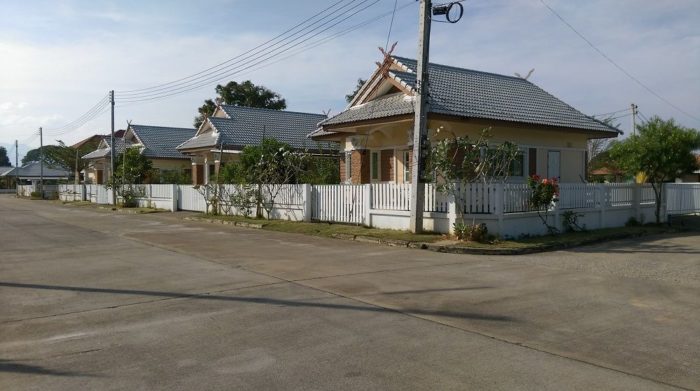
Some expats pay THB50,000 on rent, while others pay as little as THB7,000 per month. In other words, the cost of rent depends on factors like location, type of housing, and facilities.
To determine how much you might pay in rent per month, ask yourself these questions:
- Which city and province in Thailand do I want to live in?
- Do I want to live in the heart of the city, on the outskirts, or in rural Thailand?
- Do I want to rent a condo or a townhouse?
- Do I prefer a studio, one-bedroom, two-bedroom, or four-bedroom?
- Do I want a place that’s furnished, or do I want to buy your own furniture?
- Do I need a swimming pool or a gym?
- How far can I live from public transportation and main roads?
Your answers to these questions will determine how much you pay in rent. However, the three biggest factors that affect rental prices are:
- province
- neighborhood
- room size
A 30 square-meter studio apartment in Bangkok starts at around THB13,000 per month in popular expat areas like On Nut. In business districts like Asok or Silom, prices for the same size room can start at THB30,000.
Read more: An In-Depth Guide to Renting an Apartment in Bangkok
In Chiang Mai, a 30 square-meter unit starts at around THB8,000 per month, even if it’s close to the city. In Phuket, the same size unit starts at THB10,000 per month.
In Bangkok, if you want to rent a house with a small front and back yard, expect to pay around THB30,000. In Samut Prakan province, prices start at around THB16,000. If you live in rural Northeast Thailand, you can rent a 608 square-meter house for only THB5,000 per month.
The price you see from the internet or get from an agent is often negotiable. If you know what to do, it’s possible to negotiate your rent down by 40%.
You can find out more from our rent negotiation strategy. It’s based on our editor’s experience where he was able to negotiate his price down from 23,000 baht to 15,000 baht per month.
It’s one of our 100+ exclusive pieces of content available only to our premium subscribers.
To get access, please become a subscriber.
Keep in mind these are just starting prices. If you’re looking for something on the luxurious end, expect to pay well over THB100,000 per month.
Tip: The best way to save on rent is to find someone to share the cost with. Having a roommate helps you save 50 percent on rent, electricity, water, and Internet — if you split the bills 50/50.
Read more: Renting a House in Thailand: Read This Before Signing That Lease
Essential Bills
The following expenses are non-negotiable when it comes to your cost of living in Thailand. However, you have a lot of options, so costs vary depending on the type of service you get and/or how often you use it.
Electricity
Electricity costs, unlike rent, is one of the expenses you can control every month.
During the cooler months in Thailand, my electricity bill is slightly over THB3,000 per month. When it gets hot, my bill creeps up to nearly THB5,000 per month. Keep in mind that we spend a lot of time at home during the day running the air conditioners. Then we run the air every night while sleeping.
If you want to cut back on your electricity bill, turn off your air conditioner at night and use a fan instead.
If you can’t live without the air conditioner running, expect your electric bill to be around THB2,000 per month if you live in a one-bedroom condo. If you live in a multi-bedroom house and run a few air conditioners all day and night, expect to pay around THB4,000 per month — at a minimum.
Tip: Keep in mind that the age and condition of the air conditioner affects monthly costs as well. I know one guy whose electric bill was more than his THB6,000 monthly rent because he had an old clunker of a unit.
Water
Water in Thailand is inexpensive. For my family of four, three of whom are women who love long showers, I spend about THB300 per month on water.
If you live alone in a condo, your water bill shouldn’t be more than THB100 per month.
Some condo management companies charge quarterly for water. If this is the case, triple the costs listed above to come up with your estimated water bill.
Internet
For around THB650 per month, you can get a basic high-speed Internet package that could handle most of your personal and business needs.
With this package, you get 500Mbps of download speed and 500Mbps of upload speed. However, if you want to pay for faster speeds, more expensive packages are available. AIS has a few for between THB1,099 and THB1,399.
Thailand’s Internet is still very reliable in newer buildings and residential areas. Most older condo buildings, though, aren’t equipped to handle high-speed Internet. So, service tends to be slower in these areas, with download and upload speeds of 50 Mbps each.
Fortunately, you can still stream Netflix in Thailand and watch YouTube uninterrupted.
Good to know: Thailand, at one time, had some of the fastest high-speed Internet service in the world, sometimes ranking in the top 10 of Speedtest’s global index. Nowadays, it has dropped quite low, currently sitting in the number 46 spot.
Read more: Home Internet in Thailand: Providers, Packages, and Costs
Cell Phone Plans
Compared to cell phone companies in the West, service providers in Thailand offer some great inexpensive plans that will let you text, make calls, and use the Internet for less than US$20 a month.
Many expats we know pay around THB500 for their cell phone bill every month. I swear by True’s basic plan, which gives me enough minutes and data to last a month for under THB300. A postpaid cell phone plan in this price range normally comes with 300 minutes of call time and 10Gb of Internet.
If you want a cell phone and home Internet package, True and AIS have a variety of bundles. It’s cheaper when compared to paying for the services separately.
There’s also a way to even pay only 543 baht every month, with 300 Mbps internet for your home, and a phone package with 300 minutes of calls and 10 GB of mobile internet.
You might be able to get 50% off of your current package as well. More details can be found in this article.
It’s one of our 100+ exclusive pieces of content available only to our premium subscribers.
To get access, please become a subscriber.
Extras
You might not factor the following expenses into your cost of living in Thailand, but you’ll find life a lot more comfortable if you include them into your budget.
Cable TV
If you want to watch English TV programs in Thailand, you can get a TV package from AIS. The package starts at THB199 per month for access to channels including Disney+, CNN, BBC, Nickelodeon, and more.
If you’re a sports fan, you can get TrueVision’s Now Gold plan for THB1,500 per month, which gives you access to most sports leagues around the world.
Tip: Both True and AIS have home Internet, cell phone, and cable TV bundles that save you 20 percent when compared to paying for these services separately.
Streaming Services
Many streaming services are available in Thailand. Netflix, however, remains the most popular because the streaming giant produces movies and series in Thai.
Its most popular standard plan costs THB349 per month. Other plans start at THB99 and increase up to THB419.
VPN
VPNs are necessary while living in Thailand because they help you switch your online location from Thailand to wherever in the world you come from.
Another perk to getting a VPN in Thailand is that I can stream all my favorite U.S. Netflix shows and movies that aren’t available through an Internet connection in Thailand. I use SurfShark VPN for all my needs, and I pay around US$60 a year. But since VPN providers are always running promotions, it’s best to check the link in this paragraph to find the latest deals.
Good to know: As a US expat, I can’t access some banking apps or U.S. government websites while in Thailand, so I use a VPN to route my connection through a server in the U.S. This allows me to then be able to use those apps and websites.
Laundry
Most condos and houses have washing machines, so doing your own laundry is easy. If you want to pay someone else to do your laundry, that’s also an option.
- Laundry Price per KG: Laundry costs in Thailand are calculated either per piece or per kilogram. On average, you pay THB20 per piece or THB49 per kilogram. This service includes washing, drying, ironing, picking up, and delivering your laundry.
- Laundry Service Package: You can buy a laundry service package, too. For example, you can pay THB700 per month to have 40 items washed. Laundry services are available at almost every apartment and condominium in Thailand.
- Coin-Operated Washing Machine: In addition to laundry services, you can use coin-operated washing machines all throughout the city. Otteri — a self-service laundromat — is one of the more popular options. You pay THB30 per load. Keep in mind that you need to have your own detergent and fabric softener.
Maids and Nannies
You can hire a full or part-time maid or nanny in Thailand to help with everything from house chores to taking care of your children.
- Full-Time Live-In Maid: A full-time live-in maid salary starts at THB15,000 per month. When you hire a full-time maid, she can cook, do laundry, and clean your house.
- Part-Time Maid: If you hire a part-time maid, expect to pay THB600 per week for a few hours of cleaning — including sweeping, mopping, and washing dishes — on a daily basis. For this service, you pay around THB2,400 per month.
Tip: One way to save money on maids is by renting a serviced apartment in Thailand. Usually, these buildings offer weekly cleaning services as part of the monthly rent. The mae baan, or cleaners, will do a thorough cleaning of your place, including changing the sheets and towels.
Food and Drinks
Food in Thailand can be broken up into two categories: eating out/takeaway and groceries. Costs for each category depend on what you eat and where you buy the food from.
Eating Out/Takeaway
On average, I pay around THB70 per dish at food shops and food courts. For this price, I get one dish — a bowl of noodles or plate of rice with meat and vegetables. If you eat at these places regularly, your food expenses should be no more than THB10,000 per month.
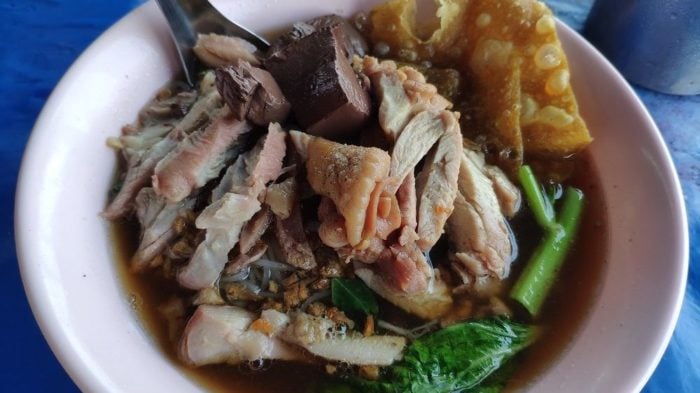
If you eat at McDonald’s, KFC, or Taco Bell, however, expect to pay at least THB300 per meal.
At mid-priced Thai restaurants, meals start at around THB150 per person. On the higher end, hotel seafood buffets cost around THB1,500 per meal, and a premium sushi set from a Japanese eatery in Bangkok starts at THB700.
Groceries
Grocery costs in Thailand depend on what you buy and where.
Local Thai vegetables are affordable. For just THB150, you can buy a week’s worth of produce from your neighborhood market, including onions, garlic, scallions, carrots, and more.
As for fruits, they are also affordable as long as you buy them during the growing season. I am a huge fan of mangos, and I stock up on a few kilos per week. Each kilo cost THB60. In fact, most local Thai fruits will cost between THB40 and THB60.
Local pork and chicken is still affordable, but the cost has been going up in Thailand, especially for quality meat. Expect to pay around
- THB150 per kilo of pork
- THB90 per kilo of chicken
- Beef, on the other hand, is even more expensive. You can get Thai-French beef for around THB500 per kilo. But imported beef from Australia or Japan costs much more.
Surprisingly, Makro has begun selling imported grain- and grass-feed beef at their locations, and the prices are some of the lowest I’ve found in all of Bangkok. For instance, you can get cuts of filet mignon for under THB200.
Tip: One hack I sometimes try (thanks to the advice of a Thai friend) is to go to the Japanese supermarket Don Don Donki after 8:00 PM. At that time, the store marks down all its unfrozen imported Japanese beef by 25 to 50 percent. You sometimes find some good cuts for quite cheap.
Because Thailand has a lot of expats, more and more stores are stocking imported goods from around the world. If you enjoy imported foods like cheeses, butters, and quality beef, expect to pay around THB15,000 per month on groceries.
Go local, however, and your monthly grocery bill could be as low as THB6,000 per month.
Coffee
I’m not a coffee drinker, but my friend tells me that he can brew a cup of coffee at home for just THB10 when you break down a bag of beans into single servings. If you buy coffee outside, it costs around
- Convenience Store: THB40 per cup
- Local Vendor on the Street: THB60 per cup
- Cafe: THB60 to THB80 per cup
- Starbucks: Over THB120 per cup
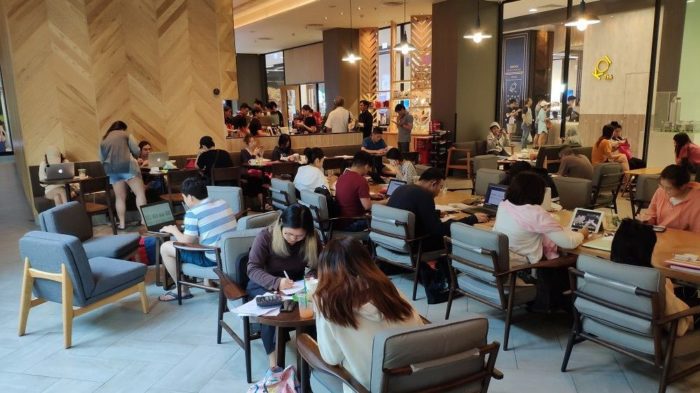
There’s a cafe on every corner of the city. In fact, you can find three or more coffee shops within arm’s reach.
Tip: To save money on coffee, you can buy coffee beans from supermarkets starting at THB185 for 250 grams and brew it yourself, which works out to about THB9 per cup.
Beer and Liquor
Local beer and liquor are cheap in Thailand, but because of import taxes, alcohol from overseas is expensive.
- A small bottle of Leo, Chang, or Singha costs around THB60 at a restaurant
- a larger bottle costs around THB100
- Imported beers from Japan or Germany start at THB60 per can. Larger bottles cost around THB130.
Wine
Thailand doesn’t produce many grape wines. However, in Chiang Mai farmers do make fruit wines from strawberries, mulberries, and more.
- A 750ml bottle of fruit wine costs around THB300 to THB400. But be forewarned, this stuff is sweet and thick, like aged port wine.
- You can find a decent bottle of imported Italian or Chilean wine from Wine Connection starting at THB750. Villa Market also has a selection of imported wines starting at THB600.
Insurances
Despite healthcare costs being relatively inexpensive in Thailand, one major accident or health scare could cause your cost of living in Thailand to skyrocket.
That said, make sure to cover yourself with insurance while in Thailand.
Health Insurance
Healthcare in Thailand will be the most unpredictable of all your expenses.
One year, you may not pay a single baht for medical treatment or medication. The next year, you might get sick or have an accident and have to pay THB100,000 out of pocket.
In fact, I spent my first eight years in Thailand never having a serious medical issue. Then one day I had to have my gallbladder removed in an emergency surgery, and it cost me THB85,000 at Chulalongkorn Hospital.
Since then, I’ve always made I am covered by health insurance. This is also why it’s a good idea to get health insurance for yourself (and your family) in Thailand.
You can find a wide range of expat health insurance plans that will cover you in Thailand.
- Most middle-of-the-road plans cost about THB40,000 a year and give you at least 5 million Thai Baht in coverage. Luma is a great choice for budget-minded expats.
- For comprehensive insurance, you should expect to pay around THB 60,000 per year, and it comes with 35 million Thai Baht in coverage. Cigna is recommended.
Healthcare can be a big expense in Thailand. However, you can significantly decrease your hospital bills if you know where and when to go.
We have this guide on how to get great medical treatment at affordable rates in Thailand.
It’s one of our 100+ exclusive pieces of content available only to our premium subscribers.
To get access, please become a subscriber.
Because there’s so much to be said about Thailand expat health insurance, we’ve created a separate guide for you to read.
There will also come a time when you have to make a trip to the doctor’s office in Thailand. If you don’t want to visit a local clinic, you’ll most likely go to a private hospital.
Seeing a doctor at one of the private hospitals in Thailand usually costs around THB1,000 to THB3,000. This amount covers the nurse’s and doctor’s fees plus any standard medication. If you have outpatient insurance, you won’t have to pay out of pocket for these costs.
Read more: Health Insurance in Thailand: What You Need to Know as an Expat
Car/Motorbike Insurance
If you drive in Thailand, you must have car or motorbike insurance.
If you ever get into an accident, cause damage to people or property, and don’t have insurance, the expenses will come out of your pocket.
Also, if you’re hit while driving your car or motorbike, and the offender doesn’t have insurance, you will be responsible for paying for injuries and damages to you and your property unless you have insurance.
- I pay THB6,900 per year for a Safety4U Plus 2 car insurance plan with zero deductible on a 2007 van.
- A friend of mine pays THB13,000 per year for a standard four-year-old Japanese car with Type-1 car insurance including a THB3,000 deductible.
As for Thailand motorcycle insurance costs per year, expect to pay THB1,000 to THB2,000 per year.
Read more: Car Insurance in Thailand: A Complete Buying Guide
Personal Care
Taking care of yourself comes at a price, so you should include these expenses in your cost of living in Thailand if you’re going to come up with a realistic monthly total.
Gym Memberships
With all the gyms available in Thailand, you have no reason to skip exercising while in the country. In fact, depending on where you live, your condo or neighborhood might have a gym that you can use for free.
Otherwise, you can pay for a gym membership for between THB1,200 and THB3,000 per month. Prices depend on the quality of facilities provided by the gym.
- THB1,200 per month membership may have mostly cardio and basic exercise equipment and showers
- THB3,000 per month membership comes with spa treatments and exercise classes.
If you’re really serious about working out, you can hire a personal trainer in Bangkok for roughly THB1,000 to THB2,500 per session. You can also pay THB7,000 per month to train at one of the many Muay Thai gyms in Bangkok.
If you’re on a budget, you can invest in a nice pair of sneakers, go to the nearest park, and run or walk without having to pay anything. Some parks even have free outdoor exercise equipment.
Dentist Visits
Dentists in Thailand are much more inexpensive than they are in the West. You can get your teeth cleaned for as low as THB1,000 at basic dentist offices. If you’d rather visit a dentist who uses the most up-to-date equipment and techniques, expect to pay around THB1,500 for a cleaning.
I’ve also had a root canal done in Bangkok, which included two separate treatments, and I paid only THB8,000.
Read more: How to Find the Best Dentist in Bangkok: Clinics, Prices, and More
Hospital Stays
If you visit a doctor and he or she wants to admit you to the hospital, expect to pay at least THB8,000 per night for just a standard room. Add nurses fees and medication on top of that, and you could be looking at THB20,000 to THB30,000 per night.
My friend’s mother had an appendix operation at a private hospital in Suphanburi. It cost her around THB100,000 for the entire procedure and two nights in the hospital.
If you’re admitted to the ICU, that cost shoots up to around THB100,000 per day.
Alternatively, you can go to a government hospital if you don’t mind waiting in long queues. But this option is only ideal if you know how to speak Thai or go there with someone who could.
Medication
Medication in Thailand is also rather inexpensive. You can get any cold or flu medicine over the counter at most 7-Elevens or neighborhood pharmacies. A 10-pack of Tylenol or Sara (paracetamol) costs only THB20, while most antibiotics start at around THB150. But I’ve paid for some special antibiotics that cost over THB1,000.
If you visit a doctor and he or she prescribes you medicine, you may have to get it at the hospital or from a licensed pharmacist.
Some prescribed medications such as antibiotics for adults can be quite expensive. But there is a way to reduce costs by up to 300 percent.
Read more: How to Save Over 300% of the Cost of Medication in Thailand (exclusive to ExpatDen Premium Members only – find out more)
Health Checkups
In order to avoid any serious health complications, you should get an annual health checkup.
On average, health checkups cost a few thousand Thai Baht. However, you should get comprehensive annual checkups, especially when you enter your forties. A comprehensive health checkup starts at about THB11,000 at mid-tier private hospitals.
Read more: Bangkok Health Checkups: Costs, Packages, and Hospitals
Haircuts
Men’s haircuts start at around THB250 at salons and around THB80 at local barber shops. Prices can double at fancier salons. The local barber where I visit raised his prices to THB300 in 2023. But I think it’s still a great price for the service you get, which includes a haircut and wash and dry.
For women, the cost of a haircut is usually more, depending on the service. A wash and dry starts at only THB200, but add in a trim and some coloring and that can double, triple, or even cost 10 times more.
Transportation
Transportation is one of the cheaper costs of living in Thailand. If you live in Bangkok and don’t have a car, then motorcycle taxis, the BTS (skytrain), or the MRT (subway train) are going to be your main transportation options. As for me, I rarely use public transportation, so my monthly transportation cost is lower than THB100. But I do break down some average costs in this section.
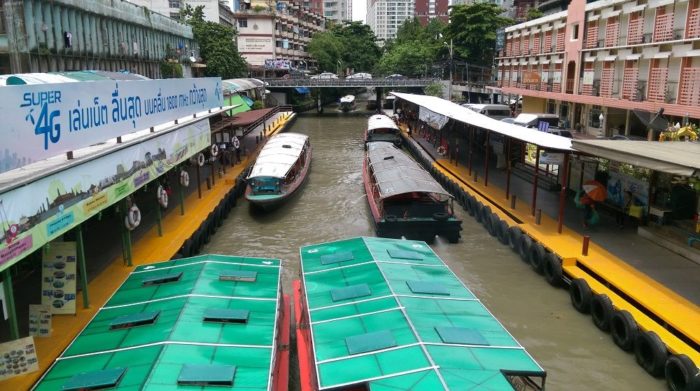
A typical commuting scenario involves taking a motorcycle taxi from your condo to a BTS or MRT station, and then taking the BTS or MRT to your workplace.
- Motorcycle Taxis and BTS/MRT: Motorcycle taxis cost around THB30 for short distances, and the BTS and MRT varies depending on how many stops you have to take. In general, though, you could spend THB50 or more to travel the BTS and MRT lines one way.
- Bus: You’ll spend less on transportation if you learn the bus routes. Bus fares in Thailand are only around THB10 to THB30 per trip, or around THB600 per month if you travel five days a week.
- Taxi: Taxi costs around THB100 to THB200 per ride in Bangkok, depending on the distance. If you take a taxi every day, you might spend around THB6,000 per month.
- Car Purchase: If living outside of Bangkok, it’s a good idea to buy your own car. Gas prices have gone up quite a bit, so you could spend at least THB2,000 per month filling up the tank.
- Car Rental: You can also rent a car for THB15,000 per month. I find that, on average, I spend THB1,700 per month filling up my van with diesel.
- Motorbike Rental: You can rent a motorbike for THB2,500 per month. For motorbikes, gas shouldn’t cost more than THB700 per month, depending on how much you drive.
The overall cost of transportation in Thailand is very affordable. The only exception is Phuket, where a one-way taxi ride from Phuket Airport to Patong beach costs THB800.
Travel
Thailand has plenty of places to vacation at. And because accommodations and transportation are relatively inexpensive, you can enjoy much of what the country has to offer for a fraction of what you’d pay elsewhere.
When we asked our team of writers and editors how much they spend when vacationing in Thailand, and they said somewhere between THB1,000 to THB1,500 per day, per person.

- Hotel: A three-star hotel costs around THB1,200 per night. If you don’t mind sleeping in a hostel, you could find places for just a few hundred Thai Baht per night.
- Homestays, Villas, Bungalows: Thailand also has plenty of homestays, villas, and bungalows for rent. Prices start at just THB400 per night but increase into the tens of thousands for more fancier resorts.
If you need to get from Bangkok to your vacation destination, you can always take a train to save money.
- Sleeper Train: For a sleeper train, expect to pay between THB600 and THB2,000 from Bangkok to Chiang Mai, depending on the ticket class. If you take the bus, it costs around THB700.
- Car Rental: The average cost of renting a car in Thailand is THB1,000 per day. If you rent an economical car, it’ll be THB600 to THB800 per day.
If you really want to save money, there are even cheaper options. For example, you can take the train from Bangkok to Ayutthaya from THB15 to THB35 for third class seats.
Entertainment
There is no shortage of entertainment options in Thailand.
You can go ice skating or bowling, hit the arcades, visit a movie theater, or listen to live music.
Movie theaters in Thailand are spacious and clean, and the screens are huge and crystal clear. The seats are comfortable, too, and there’s usually a great selection of English, Thai, and foreign movies. Tickets prices range from THB280 to THB300.
However, popcorn, snacks, and beverages are overpriced like in many cinemas around the world. In fact, food and drinks could cost as much as the ticket itself.
For a night of ice skating or bowling, expect to pay around THB300 for equipment rental fees. Most places sell food and drinks as well.
Education
If you plan to take Thai language lessons or enroll your children in school, tuition will be another expense to factor into your cost of living in Thailand.
Thai Language Schools
No matter what reason you move here, whether for work or to retire in Thailand, you should take a Thai language course.
From friendships to relationships to work opportunities, so many more things open up to you when you can speak Thai.
- Thai Language School: You’ll pay around THB3,000 per month on average for Thai language courses at a brick-and-mortar school.
- Online: Costs can drop to THB500 per month if you decide to learn Thai online.
- Private Tutor: If you want to learn through a private tutor, in most cases you can find one for around THB500 to THB600 per hour. I’ve been learning Thai with a tutor online through italki, and it costs me around THB700 per hour.
Children’s Tuition
When moving to Thailand with your family, you’ll have to think about how you’re going to educate your children. Tuition for private schools can vary, but expect to pay the following, on average:
- Government school: < THB10,000 per year, but only for kids who speak Thai
- Bilingual private school: > THB100,000 a year
- International school: THB300,000 for average international schools to THB1,000,000 per year for top-tier schools
Smaller private schools with less expensive tuition do exist. Although you won’t be getting the brand name that comes with some of Bangkok’s more popular private schools, the education at these smaller schools is on par. Also, since class sizes tend to be smaller, these schools offer more of a family vibe.
You can, of course, find online schools for much cheaper (or even free in some cases). But your options may be limited.
Some families even homeschool in Thailand. I went this route for the first five years of his oldest daughter’s education. And his youngest daughter still homeschools, for now.
Read more: Education System in Thailand: A Guide for Expats
Legal
While in Thailand, you’ll probably incur some legal expenses as part of your cost of living in Thailand as well. We’ve listed some of the common ones below.
Visas
If you have a one-year non-immigrant visa, you’ll have to apply for a new visa every year.
The cost itself isn’t too bad, though. It costs THB1,900 per year for a single-entry one-year visa and THB3,800 per year for a multiple-entry one-year visa.
But the cost of visas gets more expensive if you can’t get a long-term business visa or retirement visa. An education visa, for example, needs to be renewed every three months at THB1,900 per renewal, excluding the necessary transportation costs.
If you have a tourist visa, you may have to extend your visa every 60 days for another THB1,900 or fly out of Thailand to get another visa.
However, living in Thailand long-term on a tourist visa is considered illegal. You could get banned from re-entering Thailand if caught. Being denied entry at the airport, even if you hold a Thailand tourist visa, is not uncommon. So, if you plan to live in Thailand long-term, it’s best to get a proper visa.
If you want to apply for a Thailand Privilege Card, it’ll cost you THB15,000 per month.
Passports
There may come a time when you have to renew your passport in Thailand at your home country’s embassy, especially if you live here long term.
Depending on which country you come from, you could pay around THB1,500 for a new passport.
Lawyers
You may find yourself needing a lawyer in Thailand for various legal or business reasons.
If you get into an accident, you may need legal representation. If starting a business, you may need a lawyer to help you form your company.
Lawyer fees vary drastically and depend on which firm you chose to work with.
Read more: Lawyers in Bangkok: A List of Recommended Law Firms
Average Cost of Living in Thailand by Location
As you can see, it’s quite challenging to come up with the average cost of living in Thailand due to various factors. But we can narrow down the amount depending on where you decide to live. Let’s look at some of the more popular spots in Thailand.
Bangkok
To give you a few specific cases, let’s look at the cost of living in Thailand for some of our team members in Bangkok.
ExpatDen founder Karsten Aichholz spent THB80,658.58 a month living as an entrepreneur in Bangkok. On the other hand, ExpatDen editor John Wolcott spends THB78,465 a month for a family of four.
ExpatDen contributing writer Richard McCully, who shares a space with his girlfriend, spent THB95,000 per month on his expenses in Bangkok. But the cost of his accommodations is higher than usual because he decided to buy a condo in Bangkok.
It also means that once his condo is paid off, his costs will significantly decrease. If he had rented a condo instead of buying one, his cost of living would have been only THB75,000 per month.
Read more:
- What Does THB 50,000 (USD$1,350) a Month Get You in Bangkok?
- What Does THB 50,000 (USD$1,350) a Month Get You in Bangkok’s Suburbs?
Chiang Mai
The cost of living in Chiang Mai is 10 percent to 20 percent cheaper than in Bangkok. In fact, Joyoushapes from Across Every Border said she spends only THB25,000 per month to live in Chiang Mai.
That number makes sense considering that you can get a decent condo for under THB10,000 per month in the northern province.
But if you live in Chiang Mai, you should have some form of transportation, as taxis will start to add up over the long haul. It would be cheaper to rent a car or motorbike. Food and leisure activities are also cheaper in Chiang Mai, and you can enjoy plenty of free outdoor activities.
Read more: What Does THB 50,000 (USD$1,350) a Month Get You in Chiang Mai?
Phuket
The cost of living in Phuket is among the highest in Thailand; it’s even more expensive than Bangkok.
In fact, at THB70 to THB100 for one plate of food, the average cost per meal in Phuket is more expensive than in most parts of Thailand.
If you don’t have your own car or motorcycle, the cost of transportation can also be extremely high. You might pay more than THB1,000 for one taxi ride.
To live in Phuket, you should prepare to spend at least THB40,000 per month if you rent a place for THB15,000. But you can still get by with THB30,000 a month if you cook your own food and don’t drink often.
If you want to live a somewhat comfortable life on the island, your average cost of living in Phuket should be around THB70,000 per month. Joose the Nomad has a detailed video on how far this amount will take you each month in 2025.
Read more: What Does THB 50,000 (USD$1,350) a Month Get You in Phuket?
Pattaya
Because it’s a popular tourist destination, Pattaya’s cost of living is similar to Bangkok’s.
Rent, however, is a little bit cheaper for smaller condos. You can still find a studio serviced apartment for around THB8,000 per month in the heart of Pattaya. Food prices in Pattaya tend to be on par with those in Bangkok.
As for larger condos and houses, the sky’s the limit depending on where in Pattaya you want to live. In general, north Pattaya is more expensive than south Pattaya. And the east side of Pattaya is a little quieter and cheaper than the beach.
Pattaya resident Really Riley Travels breaks down what it would cost the average expat to live in the coastal city each month. And he comes up with a budget of THB56,000.
But on the flipside, YouTuber Alex Toma claims you can get by in Pattaya with just US$20 per day, which works out to about THB24,000 per month. So, as you can see, you can live here on a variety of budgets.
Read more: What Does THB 50,000 (USD$1,350) a Month Get You in Pattaya?
Hua Hin
Hua Hin is similar to Pattaya in terms of cost of living in Thailand.
For around THB38,000 a month, two people can afford a modest lifestyle in the city. The folks over at Full Time Abroad break down how they spend this much each month while still enjoying their life in Thailand.
That said, food, drinks, hospital visits, and all the other costs that come with daily life are generally the same as what you’d find in Pattaya. So, most expats can afford to call the province home on just about THB30,000 on the lower end and THB60,000 on average.
Where Hua Hin and Pattaya differ from each other is in lifestyle. Hua Hin is quieter than its neighbor across the gulf. So, you’ll be less tempted to go out and spend money.
Read more: What Does THB 50,000 (USD$1,350) a Month Get You in Hua Hin?
Koh Samui
Koh Samui tends to be a more expensive place to live compared to mainland Thailand.
Food, drinks, clothes, building materials, fuel, laborers, staff, knowledge, expertise, and all other forms of tangible and intangible resources — it all has to be boated in from Surat Thani.
That said, to enjoy the island, expect to spend at least THB50,000 each month. Josh on the Move shows you what you can get for a little more than that, at THB60,000 per month, in his popular YouTube video. For double that amount, you can afford a comfortable lifestyle in one of the beachside villas.
How Lifestyle Choices Impact Your Cost of Living in Thailand
Although I did my best to give an average monthly budget for Thailand, your costs will depend on the following:
- where you choose to live
- how many people you have to provide for
- the kind of lifestyle you’re after
- the exchange rates of your home currency
For instance, friends of mine who live in Chiang Mai pay far less per month than friends who live in Bangkok or Phuket. And, as expected, my single friends have lower monthly bills than my friends with families and kids.
But location is just one part of the equation. Lifestyle also affects your cost of living in Thailand. Two expats can live in Bangkok and have completely different budgets depending on what they rent, where they socialize, what they eat, and how often they travel.
Lastly, exchange rates also impact your monthly budget. If you retire in Thailand from the U.K. and live the same exact lifestyle that a retiree from Australia lives, you’ll spend far less in reality because of the more favorable exchange rates.
Having said all this, these aren’t the only things that will affect your cost of living in Thailand. Inflation does as well, and that’s what we’re going to look at next.
Effects of Inflation on Thailand’s Cost of Living
Now that I’ve broken down the average monthly expenses, I want to briefly talk about how inflation has affected the cost of living in Thailand.
Although inflation rates in Thailand did spike in 2022 — as they did with the rest of the world — prices on goods and services have remained stable or have only slightly increased. In fact, inflation rates in Thailand have only jumped up by a small percentage since the 1970s.
Despite this information, a 2024 Ipsos survey revealed that 65 percent of Thais believe prices in Thailand will continue to soar. This explains why fewer people are choosing to start families. The cost of education, food, and everyday needs is becoming a burden.
I have seen the direct impact of inflation as well. Not long ago, I was talking to the owner of a sushi restaurant in my neighborhood. I noticed one day that the prices went up by 40 percent. The owner told me that he didn’t want to raise prices, but he had no choice as the cost of his goods and supplies went up drastically. Due to the raise in prices, I cut back on how often I eat there, and I’m sure many of the restaurant’s regular customers have done the same.
A lot of Thai restaurants are doing the same. Most of them raised their prices and some have even cut back on how much meat or vegetables they add to your plate, instead opting to fill the dish with more rice.
That said, the cost of living in Thailand is still relatively low compared to the Western world. You have far more purchasing power in Thailand with your money. Also, rent and healthcare remain affordable. In fact, our editor’s rent has never once been raised in over 10 years of living in Thailand. This is despite a new MRT line being built right down the road from his complex. A friend who rents a house in Bang Kaew has also been paying the same amount of rent for 14 years.
So, as you can see, although Thailand was hit with inflation after COVID and food prices did go up, many other prices have remained the same.
Living in Thailand on US$1,000 Per Month
For US$1,000 per month, or THB35,000, here’s a breakdown of how a single person living in Thailand can spend that money.
- THB10,000 on a studio condo or apartment (not within walking distance from the BTS or MRT) and utilities
- THB300 on a basic cell phone plan with limited talk minutes and Internet
- THB550 on Internet service (if needed)
- THB10,000 on food and drinks
- THB2,500 on one of the lower-end health insurance plans found on Mister Prakan
That would leave THB6,900 for either travel, savings, or both.
Living in Thailand on US$2,000 Per Month
If a single person doubles that number to US$2,000, or THB70,000, here’s what he or she would be able to afford in Thailand each month.
- THB15,000 on a one-bedroom condo (within walking distance from the BTS or MRT) and utilities
- THB650 on a cell phone plan with over 200 minutes of talk time and Internet
- THB550 on Internet service (if needed)
- THB15,000 on local and Western food and drinks
- THB3,500 on a mid-tier health insurance plan from Luma
That would leave THB35,300 for travel, savings, gym memberships, or pursuing hobbies.
Living in Thailand on US$3,000 Per Month
For US$3,000, or THB105,000, a single person would live quite comfortably in Thailand. Here’s how that person could spend that amount each month.
- THB30,000 on a multiple-bedroom condo (in one of the prime real estate areas along Sukhumvit or Silom) and utilities
- THB1,200 on a cell phone plan with unlimited talk time and Internet
- THB1,200 on the highest speed Internet service
- THB30,000 on local and Western food, drinks, and some fine dining
- THB5,500 on Cigna’s premium global health insurance packages
That would leave THB35,300 for travel, savings, gym memberships, or pursuing hobbies.
Living in Thailand on US$5,000 Per Month
If a single person has US$5,000 to work with, or THB175,000, here’s what’s possible to afford in Thailand every month.
- THB90,000 on a penthouse or two-story loft in the heart of Bangkok and utilities
- THB1,200 on a cell phone plan with unlimited talk time and Internet
- THB1,200 on the fastest speed Internet service
- THB40,000 on local and Western food, drinks, and frequent fine dining
- THB7,000 on one of Cigna’s premium global health insurance plans
That would leave THB35,600 for travel, savings, gym memberships, or pursuing hobbies.
Cost of Living in Thailand for One Year
As you can tell from the scenarios above, the amount you spend to live in Thailand for one year will be in direct relation to the kind of lifestyle you want to have while in the country.
On the lower end, expect to pay around US$11,000, or THB360,000, for just the basics. This includes rent, a cell phone plan, Internet, food and drinks, and a modest health insurance plan.
On the opposite end, your cost of living in Thailand for one year can be as much as US$60,000, or THB2,100,000. You’ll get to live in the nicest condos, eat anywhere you want, and afford the best health insurance plans. Plus, you’d still have plenty of money left over for traveling, investing, or saving.
Where Are the Cheapest Places to Live in Thailand?
If you’re looking for the cheapest place to live in Thailand, you should look in provinces such as Trat, Nong Khai, Udon Thani, and Mukdahan. These haven’t yet been touched by the flood of tourism that has hit other parts of the country.
The cost of living in these cities can be very cheap, in some cases even less than THB12,000 per month.
But if you don’t know how to speak Thai, it’s going to be a real challenge living in these areas. Western food is also rarely available, and public transportation is limited.
Normally, expats who live in these cities are either hired to teach English at a local school or live there with their Thai spouse.
How Much Do You Need Per Month?
The short answer is this: it depends on your lifestyle. If you want some numbers, THB35,000 per month should be enough to live in Bangkok, Pattaya, and Hua Hin as a single person.
With this budget, you can rent a small condo, eat local food, enjoy a few special meals per week, and travel on a budget.
But if you want to have a comfortable lifestyle, your cost of living in Thailand will have to be at least THB45,000 a month. Many retirees in Thailand are spending this much to live here comfortably.
As a general rule of thumb, if you lived in Chiang Mai, you would need 20 percent less than in Bangkok. But if you lived in Phuket, you would need 20 percent more.
If you have someone to share expenses with, it’s possible to live in Thailand for less than THB20,000 per month. And if you live in a rural area, you could spend as little as THB12,000 per month.
To calculate your estimated cost of living in Thailand, you can use our popular cost of living calculator. It’ll estimate how much you need every month based on your lifestyle.
You can also subscribe to ExpatDen Premium to discover how to significantly decrease your cost of living in Thailand.
Cost of Living Vs. Quality of Life According to ExpatDen Readers
We recently surveyed some ExpatDen readers about their cost of living, quality of life, and what they’d change as far as their budgets. Here’s what these expats from all over Thailand has to say.
Jeff and Jee, who split their time between Thailand and Florida, USA, live in Bang Saray, Chonburi, and spend THB140,000 each month. They answered:
“Overall quality is the same as we have in the USA. Quality of life in Thailand is more affordable. Still, there are pros and cons: clean air, clean water, and no safety while driving all cancel out the financial offset compared to the quality of life in the USA with safe air, water, and driving. Property ownership would eliminate monthly rent. Purchasing land or property is an option for us.
One reader who would like to remain anonymous spends THB25,000 per month in Chiang Mai and had this to say:
“I cannot change [my budget], but I now notice that it is way more expensive now because tourists have ruined [Chiang Mai]. There is nothing I can change unless I stop eating. I already hardly go anywhere unless I can walk.”
JW, who lives in Minburi, spends THB250,000 per moth with THB90,000 of that going toward entertainment. He feels the quality of life he gets is perfect for that amount. Although he feels his spending is right where it needs to be, he has thought about changing one thing. He said:
“It’s perfect. [But] I’d stop that 90K a month spend.”
Rudy lives in Kham Muang, Kalasin, with his wife, and together they spend THB30,000 per month. This gets them a very good quality of live. They don’t have to pay for rent as they own a house, so most of their budget goes to food and travel. He does wish he could change one part of his budget:
“[We] have to pay people to drive, as we can’t drive.”
Balraj Sandhu lives in Udon Thani and provides for two people with their cost coming out to THB40,000 per month. This, he admits, gets him an excellent quality of life. Most of that goes to food and household bills. However, there is one thing he wish he could lower, and that’s his electric cost. He said:
“Cheaper energy costs; very high in hot weather.”
An anonymous reader lives in Phayao, provides for three people, and spends roughly THB150,000 per month. A majority of this costs go to electricity. But he still describes his quality of life as excellent. He has, however, been contemplating one way to reduce his monthly budget:
“Install a solar system to reduce electric bills.”
Chris Harvey lives in Roi Et and provides for two people. He spends THB70,000 per month, most of that going toward food and fuel. That said, he is completely happy with the quality of life he gets for his monthly spending. He said:
“I wouldn’t change anything.”
Ren lives in Chiang Mai and provides for four people in his household. His total monthly cost is about THB90,000 per month. Most of that goes toward transportation and food. That said, he still feels his quality of life is great for that amount. But he would change one expense if he could:
“Insurance costs.”
Another anonymous reader from the UK who is now living in Udon Thani spends THB50,000 per month taking care of three people in his household. About THB40,000 goes to his wife so she can look after household expenses. A majority of that money goes to food. For this amount, he said he lives a fantastic life and would only change one thing:
“Reduce my gin intake for my health. Just joking — I don’t drink that much.”
Another anonymous reader from the UK who lives in Mae Wan, Chiang Mai, spends about THB30,000 per month on himself and his partner. For that amount, he said he gets a better life than he would if he lived in the UK. As for what he’d change, it would be much. He said:
“I’m fairly happy with what I spend.”
What’s Your Cost of Living?
Everyone’s standards differ, and the same can be said when it comes to the cost of living in Thailand. One person may not want to spend more than THB50,000 per month, while another might not be able to spend less than that.
Either way, this guide has given you some good references on the average cost of living in the country by lifestyle and location. But these are just starting points. The only way to know for sure how much you’ll spend each month is to live here full time.
Having said that, I’d love to hear what you spend each month as an expat living in Thailand. Drop a comment below and tell us what province you live in, how much you spend on average each month, and what your food and lifestyle choices are.
If you plan on living in Thailand for the foreseeable future, check out ExpatDen Premium. When you subscribe, you get immediate access to hundreds of exclusive guides that will help you set up your new life in Thailand while saving thousands of dollars.





